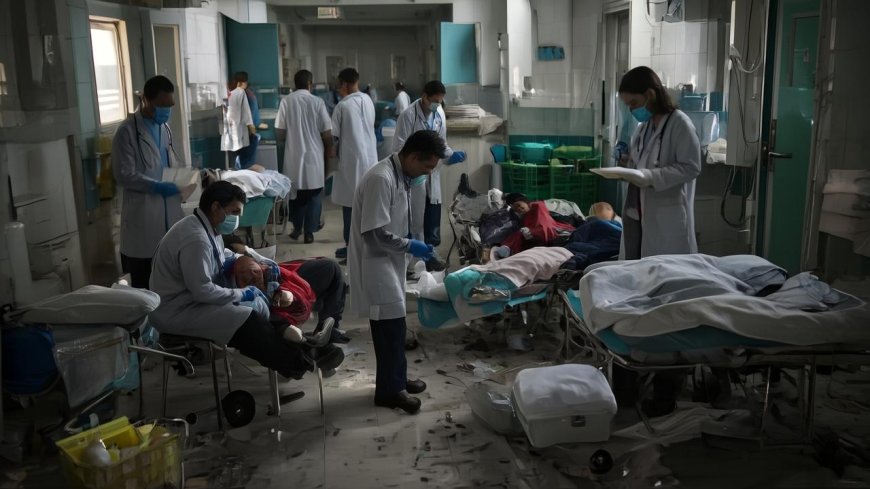Medical Aid for Gaza: Urgent Healthcare Support & How to Help
Medical aid organizations provide crucial support to Gaza's failing healthcare system. Groups like Doctors Without Borders operate emergency field hospitals that handle complex surgeries when local hospitals can't.

Gaza's healthcare system is in a state of emergency. Years of conflict, economic blockade, and limited resources have pushed medical facilities to the breaking point. Hospitals operate with frequent power outages, leaving life-saving equipment unusable for hours each day. Doctors report severe shortages of basic medications, surgical supplies, and even clean bandages.
Many medical professionals work around the clock with minimal rest, treating patients in hallways and makeshift wards. The situation has become so dire that simple procedures now carry life-threatening risks due to the lack of proper equipment and sterile conditions.
Most Urgent Medical Needs in Gaza
The medical crisis in Gaza spans across all areas of healthcare. Trauma care supplies are desperately needed to treat war-related injuries, including wound dressings, blood bags, and surgical kits. Chronic disease medications for conditions like diabetes, hypertension, and heart disease are in critically short supply.
Pediatric care faces particular challenges, with neonatal units lacking incubators and children's hospitals running out of basic antibiotics. Mental health services are overwhelmed as nearly the entire population shows symptoms of trauma and PTSD. Even basic medical items like gloves, syringes, and disinfectants are in dangerously low supply.
How International Medical Aid Makes a Difference
Medical aid organizations provide crucial support to Gaza's failing healthcare system. Groups like Doctors Without Borders operate emergency field hospitals that handle complex surgeries when local hospitals can't. Medical convoys bring in shipments of essential drugs that keep chronic disease patients alive.
Mobile clinics reach remote areas where healthcare access is nonexistent. Training programs help local medical staff handle mass casualty events and specialized cases. While these efforts can't replace a fully functioning healthcare system, they prevent countless deaths each month and provide hope where little exists.
Challenges in Delivering Medical Aid to Gaza
Getting medical supplies into Gaza faces numerous obstacles. Border restrictions often delay or deny entry of critical equipment, with authorities citing security concerns. The classification of certain medical items as "dual-use" creates bureaucratic hurdles for simple items like anesthesia machines or laboratory equipment.
Once inside Gaza, damaged infrastructure and fuel shortages make distribution difficult. Medical teams also face security risks when working in conflict zones. These challenges mean that even when aid is available, it doesn't always reach those who need it most.
Types of Medical Aid Most Needed
The most effective medical aid for Gaza addresses both immediate and long-term needs. Emergency trauma kits containing hemostatic dressings, tourniquets, and chest seals save lives during violent outbreaks. Portable ultrasound machines and digital X-ray units help diagnose injuries when power is unreliable.
Solar-powered medical equipment ensures continuity of care during blackouts. Mental health programs that train local counselors create sustainable support systems. Prosthetics and rehabilitation services help amputees regain mobility. Each type of aid fills a critical gap in Gaza's fractured healthcare landscape.
How Individuals Can Support Medical Relief Efforts
Concerned individuals worldwide can contribute to medical aid for Gaza in meaningful ways. Financial donations to reputable medical NGOs have the most direct impact, allowing organizations to purchase and transport supplies efficiently. Advocating for policy changes that ease medical aid restrictions can create systemic improvements.
Healthcare professionals can volunteer their skills through medical missions or telemedicine programs. Students and community groups can organize fundraising campaigns for specific needs like incubators or dialysis machines. Even sharing accurate information about the crisis helps maintain international attention on Gaza's medical emergency.
Long-Term Solutions for Gaza's Healthcare Crisis
While emergency medical aid is vital, sustainable solutions are equally important. Rebuilding destroyed hospitals with modern, damage-resistant designs would create more resilient facilities. Establishing local production of generic medications could reduce dependence on imports.
Training programs that develop specialized medical skills within Gaza would address critical staffing shortages. International partnerships that connect Gaza's doctors with global medical networks would improve knowledge sharing. Ultimately, any lasting solution requires political stability that allows the healthcare system to function normally without constant emergency interventions.
Success Stories: Medical Aid That Made an Impact
Despite the overwhelming challenges, medical aid has produced remarkable successes in Gaza. Neonatal units equipped through donations have dramatically reduced infant mortality rates. Emergency cardiac clinics have saved hundreds of heart attack patients. Prosthetic centers give amputees new mobility and hope.
Mental health programs help children process trauma through art and play therapy. Mobile cancer treatment units bring care to patients who can't travel. These examples prove that even in the direst circumstances, targeted medical assistance can transform and save lives.
FAQs
What are the most critical medical supplies needed in Gaza?
The most urgent needs include trauma kits, surgical supplies, antibiotics, chronic disease medications, and basic medical consumables like gloves and syringes.
Why is it difficult to get medical equipment into Gaza?
Border restrictions, security concerns, and the classification of some equipment as "dual-use" create significant bureaucratic and logistical barriers.
How can I ensure my donation goes directly to medical aid?
Donate to reputable organizations like Doctors Without Borders, MAP UK, or the Palestine Children's Relief Fund that have established medical programs in Gaza.
Are there opportunities for medical professionals to volunteer?
Yes, many organizations arrange medical missions, though requirements vary. Some also offer remote consultation opportunities via telemedicine platforms.
What happens to chronic disease patients when medications run out?
Without regular treatment, conditions like diabetes and kidney disease quickly become life-threatening, which is why consistent medication supplies are so crucial.
How does the electricity crisis affect medical care?
Frequent power outages disrupt surgeries, spoil medications requiring refrigeration, and render many medical devices unusable without backup generators.
Can medical aid really make a difference given the larger political situation?
While political solutions are needed, medical aid demonstrably saves lives every day and maintains basic human dignity in impossible circumstances.
The Ongoing Need for Medical Solidarity
The medical crisis in Gaza represents one of the most pressing humanitarian emergencies of our time. Each shipment of antibiotics, each trauma kit, each trained medical volunteer makes the difference between life and death for countless individuals. While the scale of need can feel overwhelming, the cumulative impact of sustained medical aid efforts provides real hope. The international community must continue and expand its support for Gaza's healthcare system until the day when Palestinians can access medical care with the same ease and quality as people anywhere else in the world.
































